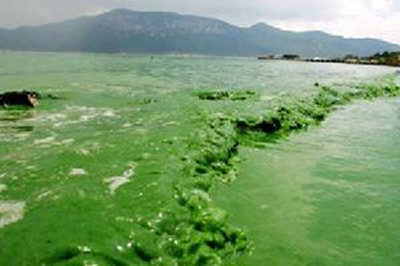Until recently, many ecologists didn't study the effect of evolution on population dynamics because evolution is much slower than the predator-prey cycle.
直到最近,許多生態(tài)學(xué)家都沒(méi)有研究種群動(dòng)態(tài)進(jìn)化所帶來(lái)的影響,因?yàn)檫M(jìn)化的速度遠(yuǎn)遠(yuǎn)慢于捕食的周期。
But a study suggests that adaptive evolution might actually play a role in the dynamics ofthe predator-prey relationship.
但是研究表明,適應(yīng)性進(jìn)化可能影響著掠食者與被掠食者之間的動(dòng)態(tài)。
Cornell University biologists studied the population dynamics of green algae and rotifers, the microscopic aquatic animals that feed on them.
康乃爾大學(xué)的生物學(xué)家研究了以綠藻為食的輪蟲(chóng)的種群動(dòng)態(tài)。
They expected that the rotifers would eat the algae and multiply until the algae population crashed.
他們預(yù)測(cè),輪蟲(chóng)將會(huì)吃掉綠藻并繁衍后代直到綠藻的種群銳減。
This would then cause the rotifer population to crash, which would allowthe algae population to recover, and the whole cycle to begin again.
由于綠藻的減少,輪蟲(chóng)的種群也會(huì)銳減,這時(shí)綠藻種群便開(kāi)始恢復(fù),整個(gè)循環(huán)周期便又開(kāi)始了。

What they observed, however, was that there was some lag between the time the algae population reached a certain density and the time the rotifer population began its recovery.
但是他們觀察到在綠藻種群到達(dá)一定的密度之后,輪蟲(chóng)種群并沒(méi)有立刻開(kāi)始恢復(fù)。
Why? And how does evolution fit into all this?
為什么呢?進(jìn)化過(guò)程是如何與之一致的呢?
Well, it turns that some algal cells are resistant to digestion, although this resistance comes at a cost: they reproduce more slowly.
實(shí)際上,有些藻類細(xì)胞會(huì)對(duì)消化產(chǎn)生抵抗性。盡管這些抵抗也是有代價(jià)的:它們的繁殖更加緩慢。
As the more dominant, non-resistant strains of algae crashed, the resistant algal cells began cloning themselves more rapidly, and this temporarily stabilized the algae population.
由于處于優(yōu)勢(shì),不抗消化的綠藻品種數(shù)量減少,抗消化的綠藻細(xì)胞開(kāi)始更加快速的繁殖,這就暫時(shí)穩(wěn)定了綠藻種群。
In the meantime, the rotifer population crashed because the rotifers had less to eat,allowing the non-resistant strains of algae to recover.
同時(shí),輪蟲(chóng)種群隨著它們食物的減少而減少,這就讓不抗消化的綠藻品種開(kāi)始恢復(fù)。
Once the non-resistant algae became common again, the rotifer population increased, completing the cycle.
一旦不抗消化的綠藻又變得普遍了,輪蟲(chóng)種群就開(kāi)始增長(zhǎng),完成整個(gè)循環(huán)周期。
So basically, adaptive evolution enabled the algae population to reestablish itself by delaying the time it took the predator population to recover.
因此,適應(yīng)性進(jìn)化使得綠藻種群能夠通過(guò)拖延捕食者種群恢復(fù)的時(shí)間來(lái)重建自己。
Understanding the effects of adaptive evolution may help scientists to better understand the behavior of drug-resistant bacteria and outbreaks of disease.
對(duì)適應(yīng)性進(jìn)化影響的了解將會(huì)幫助科學(xué)家更好的明白抗藥菌的行為以及疾病的爆發(fā)。












